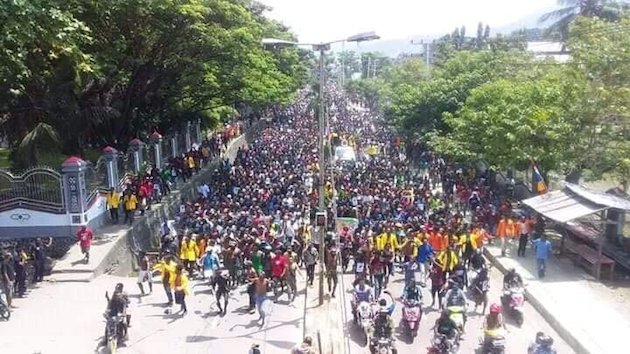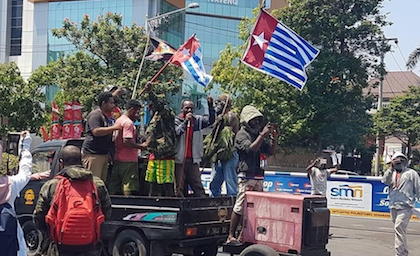Racism and aspirations of self-determination sparked demonstrations in Indonesia’s Papua province. “Papuan churches are wrongly too focused on internal issues”, says a missionary who knows the island well.
 A demonstration in Jayapura, the capital of Papua. / ULMWP
A demonstration in Jayapura, the capital of Papua. / ULMWP
There have been several demonstrations in Papua (Indonesia) in August, which have acquired special visibility because of the clashes between protesters and police.
“There is no tolerance for protesters and perpetrators of anarchist acts. Regarding Papua, measures have been taken against the people who carry out these actions”, said Indonesian President Joko Widodo on social media on Saturday.
In 2017, the United Liberation Movement for West Papua (ULMWP) submitted 1.8 million signatures to support its self-determination to the UN High Commissioner for Human Rights, Michelle Bachelet.
“We want Indonesia to leave our lands. We urge Indonesia to leave West Papua and free all the prisoners and the people's lands”, the leader of the Papuan independence movement, Benny Wenda, recently pointed out.
After the latest protests, in which at least three people died on August 29, Jakarta closed the Internet access on the island, deployed the troops in the territory and banned new demonstrations.
But is the conflict in Papua strictly political?
INDONESIA, A CULTURAL MELTING POT
The island of New Guinea is divided in two halves. To the East, the independent state of Papua New Guinea, and to the West, the Indonesian provinces of West Papua and Papua, territory known as Tanah Papua.
“Since the Special autonomy status in West Papua around 2001, there is a big migration movement of people from the western part of Indonesia (especially Javanese, Sundanese, Madurese and South Sulawesi people, who are Muslims), to West Papua”, a German missionary who has worked for 25 years in Papua, told Spanish news website Protestante Digital.
The arrival of people from other islands to Papua creates discord, if one takes into account the social immensity of this archipelago, which was reunified in a single state after the independence of the Netherlands.
Protestante Digital tried to contact the Community of Churches and Evangelical Institutions of Indonesia (PGLII), but has not received an answer.
“Indonesia consists of more than 300 cultures and ethnic groups. We must learn to maintain the unity of our nation”, a representative of the entity explained briefly.
The spokesperson also recalled that months ago a meeting was held with Indonesian Christians from more than 500 cities, to pray for the presidential elections held in April. “It is very risky to provide any information now”, the Indonesia evangelical representative said.
 Protesters claim for the independence of West Papua. / ULMWP
Protesters claim for the independence of West Papua. / ULMWP
“RACISM IS A BIG PROBLEM HERE”
The racial issue has been used by President Widodo during the revival of the conflict, in recent weeks.
“I have ordered the Chief of Police to take legal measures against racial and ethnic discrimination”, he said on social media, before the new ban on demonstration in West Papua.
According to the German missionary, who wishes to remain anonymous, “racism is a big problem in Indonesia and Papuans often becomes victims of insults. The starting point of the demonstrations and riots are the racist comments of western Indonesian people to the Papuan students in Surabaya. Papuans, who are Melanesian ('melos' means 'black') where called monkeys”.
“This caused a big solidarity demonstration movement in different cities in Java and Papua. At the same time, Papuans have criticised the conditions of their territory and what they consider a lack of development, well-being and progress of human rights”, he added.
RELIGIOUS FREEDOM BUT LACK OF TEACHING
The missionary explained that “due to the strong migration, Christians are now about 50-60% of the 4,5-5 million inhabitants. When I first came to Papua in 1986, 85% of the population was Christian. Basically, there is a big freedom for Christians”.
“The arrival of the two German missionaries Ottow and Geissler, on February 5th, 1855, is considered as a cornerstone in the history of Tanah Papua, and the beginning of the peace, education, health etc that the gospel brought. This date is now an official holiday”, he said.
Despite this strong presence of Christian churches in Tanah Papua, “there is a lack of teaching. Papuans are generally behind in education and infrastructure compare to Western Indonesia, due to the geographical and historical situation, and that the churches are wrongly too focused on internal issues”.
THE CHALLENGE OF A BETTER DEVELOPMENT AND COEXISTENCE
“The demonstrations are understandable and important, as a signal for Indonesia. But sadly, they have become anarchic, destroying many buildings, causing the closure of the internet, and turning Papua into an insecure place”, the missionary pointed out.
Furthermore, “the West Papua Freedom Movement has tried to use the momentum to claim for independence, rising the Papua flag”.
He stressed that “the Indonesian government is strict against a referendum which will not have real support overseas”.
“What the Indonesian and Papuan governments need to do is to seriously handle and condemn racism; work for a better development of Tanah Papua in every aspect; and find a solution for a peaceful coexistence between religions and tribes”.
The German missionary also believes that the Papuan church, which is still part of Indonesia, the country with the largest Muslim population in the world, “should to focus on a holistic missionary ministry, for every aspect of life”.

Las opiniones vertidas por nuestros colaboradores se realizan a nivel personal, pudiendo coincidir o no con la postura de la dirección de Protestante Digital.
Si quieres comentar o